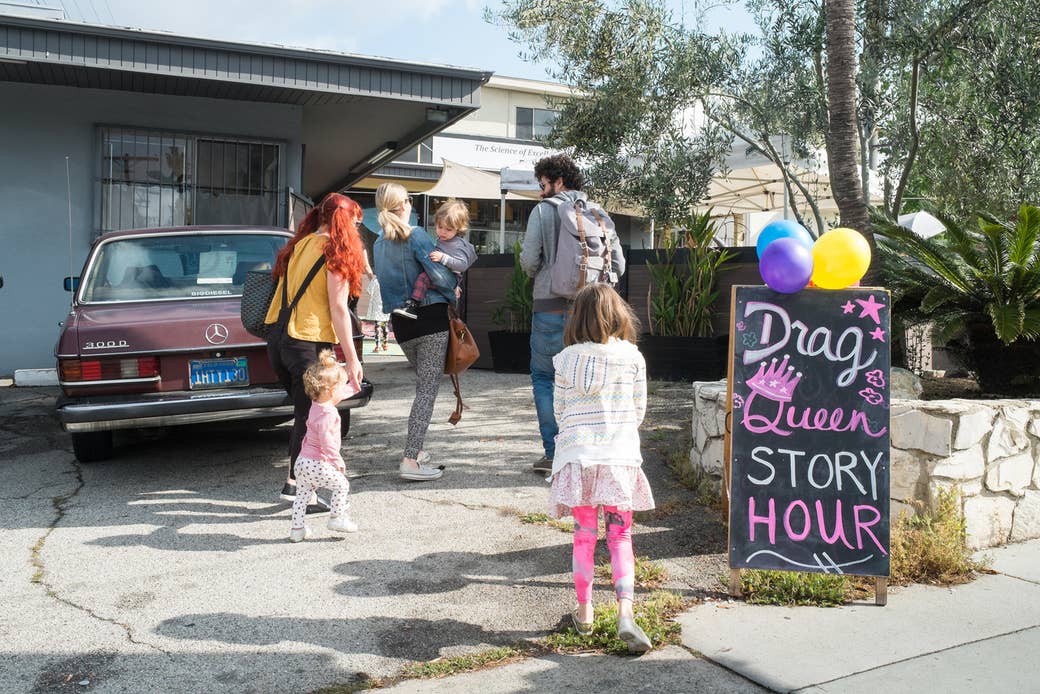
On a rainy Thursday afternoon in October, Bella Noche sashayed into the reading room at the North Forest Park library in Queens. She wore a teal wig that matched the color of her sequin top, and strappy gold stilettos. The audience of about 20 children, ages 3–6, and their caretakers erupted in applause. As the noise settled, Bella Noche eased into a chair and read three books, which playfully addressed themes of diversity and acceptance, starting with Julián Is a Mermaid. The picture book by Jessica Love tells the story of a young Latino boy mesmerized by the sight of three women dressed as shimmering mermaids.
“I love mermaids!” yelled one kid after Bella Noche introduced the book’s title.
“I love mermaids more!” yelled another.
“I love mermaids more than anybody!” yelled a third.
Parents chuckled.
“I am a mermaid,” said Bella Noche, who pinned a large, bright orange crab to one side of her hair. “Does that mean you love me?”
“No!”
Bella and the parents laughed. “OK, we’ll work on it.”
Between books, she led animated singalongs, challenging the children to “catch a bubble” — cheeks puffed dramatically, mouths closed — whenever it got too noisy. She concluded the hour with crafts, including excerpts from The Dragtivity Book, a coloring book co-produced by Drag Queen Story Hour and Sez Me, an LGBT web series for kids. The coloring book featured activities like “Find Your Drag Name!” After the event, a librarian told me this was one of the library’s most well-attended storytimes, a particular feat considering the torrential rain.
Author Michelle Tea started Drag Queen Story Hour in 2015, shortly after giving birth to her son Atticus. As a new mother, she suddenly found herself at events like storytimes at her local San Francisco library, which felt welcoming but “really straight,” she said. The writer, who identifies as queer, imagined a storytime that promoted diversity and inclusion, with a pinch of camp — a family event that reflected her own family. “There is just a sort of flair with which queers do anything,” she said. “It's just a certain sense of humor, a sense of the fantastic.” So Tea, in collaboration with RADAR Productions, organized her own fantastic take on storytime at a library in the Castro, one of the country’s most historic LGBT neighborhoods. The concept was simple: a drag queen reading queer-inclusive children’s books to kids. “It was a huge hit,” Tea said, “and then it just spread.”
Today, Drag Queen Story Hour has 27 official chapters in cities ranging from Tulsa, Oklahoma, to Bristol, England, and it has inspired countless unofficial offshoots. Readings have taken place at schools, bookstores, and museums but have mostly found a home at public libraries. For Tea, the pairing makes sense. “Librarians are the unsung heroes of our culture,” she said. “They are constantly fighting for our freedom of speech. They are on the front lines.”
Each chapter of Drag Queen Story Hour runs independently through grassroots organizing, but there have been attempts to scale. Last year, the New York chapter established itself as a nonprofit, and it has since received funding from the New York Public Library, Brooklyn Public Library, and two city council members. These resources go toward purchasing books, paying drag queens, and funding training programs — two hour-and-a-half sessions that teach drag queens to talk effectively to children and their parents about gender identity and drag.
"The truth is [drag queens and librarians] have so much in common as far as storytelling, community building, imagination."
“We really wanted to make sure we were presenting an inclusive, open definition of drag,” said Rachel Aimee, a freelance editor who’s the executive director of the New York chapter. “We didn't want to define it as a man dressing up as a woman, because that's not the case for every drag queen and we didn't want to reinforce the gender binary. That's why we felt it was really necessary to make sure everyone was on the same page.”
This mission of inclusivity has inspired other programs. Recently, Aimee started a training program for Drag Queen Story Hour specific to autistic kids, in partnership with the New York Public Library and in collaboration with a friend who runs a blog reviewing books for autistic children.
The program’s expansion has been fueled by high-profile media attention, drawn in part from the wow factor of two seemingly disparate communities converging. “People think librarians wear glasses and ‘shhh’ people all the time and aren't friendly,” said Todd Deck, a member of the American Library Association’s GLBT roundtable. “And people think drag queens are wild and crazy — but the truth is they have so much in common as far as storytelling, community building, imagination. A good children's librarian is really crafty, and I believe a lot of drag queens are pretty good with a hot-glue gun.”
As the program has expanded to more conservative parts of the country, drag queen storytimes have been thrust into the crosshairs of the culture wars. Protestors have gathered outside of libraries in Mobile, Alabama; Columbus, Georgia; and Port Jefferson, New York, with Alex Jones and other right-wing shock jocks condemning the program. For the most part, attacks on programs like the Drag Queen Story Hour have been scattershot attempts from religious groups or lone zealots — like an Iowa man who recently filmed himself burning LGBT-inclusive library books by a lake — who’ve been far outnumbered by supporters, and events have proceeded as planned.
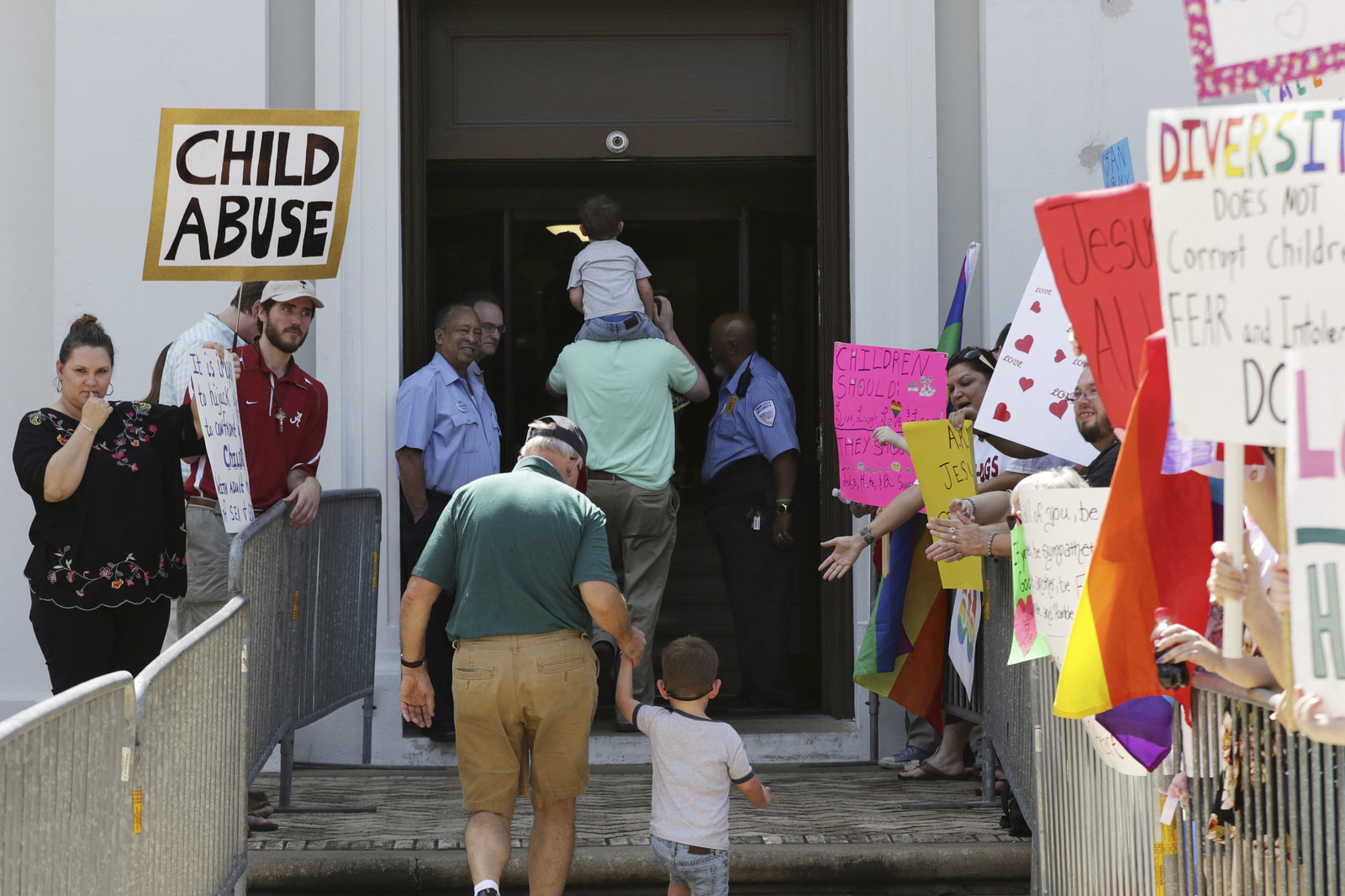
But in Lafayette, Louisiana, backlash against the program has proven effective. In September, both Lafayette Public Library and Lafayette Community College indefinitely “postponed” a drag queen storytime, citing safety concerns. The library had received pressure to cancel the event from Joel Robideaux, a top Lafayette official — and lawsuits filed by Warriors for Christ and Special Forces of Liberty alleged that the Lafayette Public Library violated the First Amendment by promoting “human secularism”; following that logic, if public libraries hosted drag queens, they should also permit room rentals for all religious groups. The person spearheading the lawsuit, Chris Sevier — who previously sued the state of Alabama to legally recognize his marriage to his laptop — framed the lawsuits as a matter of equity, not hate. “Our objection is not against the LGBTQ community,” he said. “It is against the library’s actions.”
Aside from unfounded and bigoted concerns that drag queens are predators thrusting children into a state of gender confusion and homosexuality, attacks against drag queen storytime have stirred debates about library neutrality and what responsibilities a tax-funded civic institution has in serving its community. In July, this debate reached a fever pitch when the American Library Association introduced a revised interpretation to its Bill of Rights, stating that if libraries rent meeting rooms to charities and nonprofits, it cannot exclude “hate groups from discussing their activities in the same facilities.” (A representative from the American Library Association said the revision was “not connected” to Drag Queen Story Hour.) Outcry erupted, and ALA’s council has since rescinded the revision.
At the heart of the debate is a central question that has challenged the library community for decades: What is the role of a library?
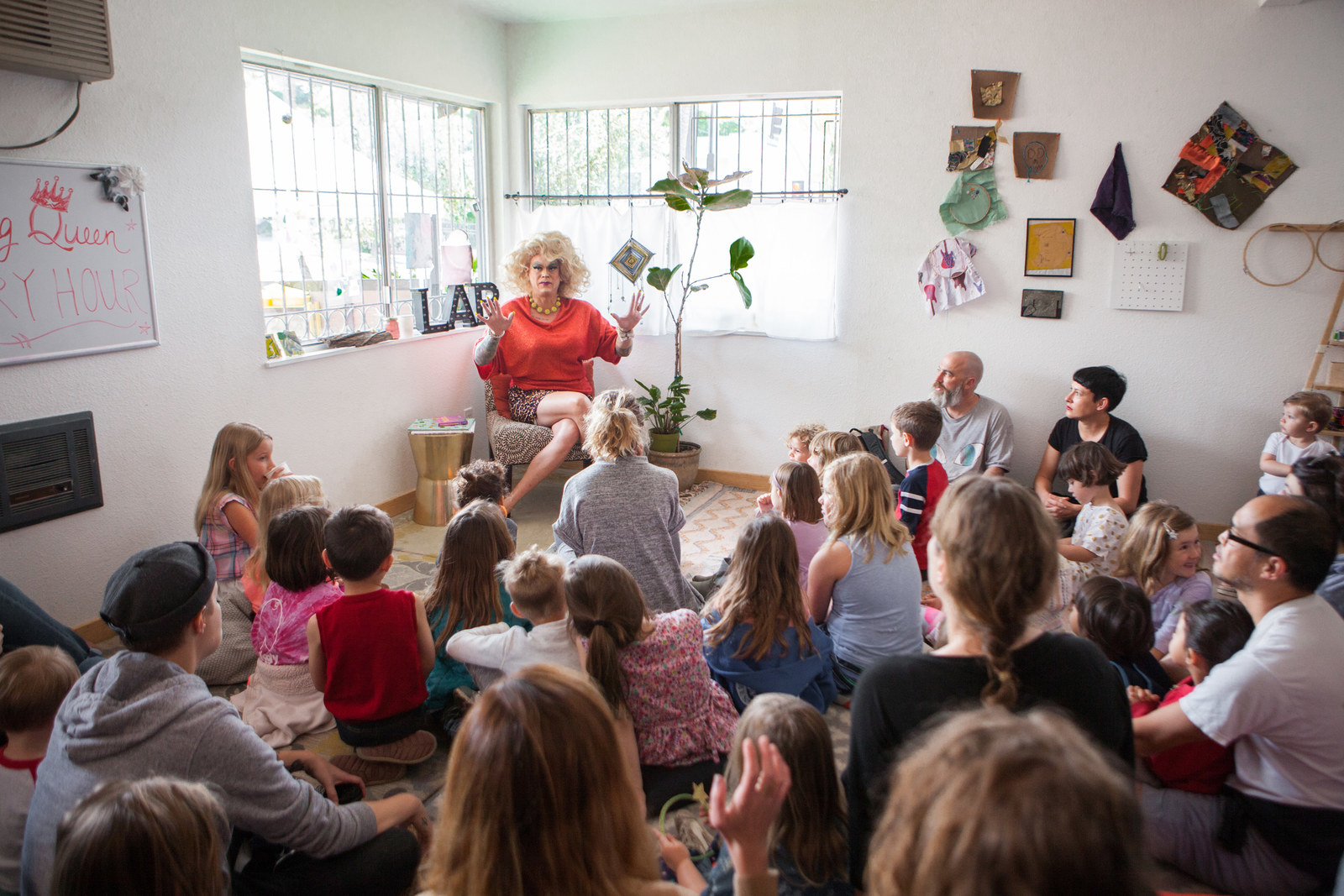
Public libraries as we know it have always contained the promise of democracy — institutions tasked with connecting all people to a wealth of information, free of charge. When Scottish American philanthropist Andrew Carnegie funded the construction of over 2,500 libraries at the turn of the 20th century, he imagined a space that would "bring books and information to all people.” He also waxed poetic: “There is not such a cradle of democracy upon the earth as the Free Public Library, this republic of letters, where neither rank, office, nor wealth receives the slightest consideration.”
For their part, librarians have looked to the American Library Association’s Bill of Rights, which emphasizes the values of equity and access, best summed up by this statement from library consultant Matt Finch: “Libraries are innately subversive institutions born of the radical notion that every single member of society deserves free, high-quality access to knowledge and culture.”
But by virtue of existing in America, public libraries have historically failed to live up to this promise. When public libraries began proliferating in the South, African Americans were denied access by laws that weren’t formally overturned until the Civil Rights Act of 1964. Discrimination also affected libraries at their most “objective”: Under the Dewey Decimal Classification system, used in over 135 countries, LGBT nonfiction was classified next to books on incest and sexual bondage, in sections titled “mental illness” and “abnormal sex relations.” This wasn’t amended until 1996. Under its new heading, “sexual relations,” the books are shelved next to books about sex work, suggesting that sex is the defining aspect of the lives of LGBT people.
"Every program we offer or don't offer, every book we shelve or don't shelve, is a stance."
Within the fantasy of the library as a democratic third space, librarians are tasked with being objective civil servants, a notion that rankles many in the field. In library school, “a lot of us get fed the line that libraries are neutral, which is a very dangerous and inaccurate piece of rhetoric to give librarians,” said Ingrid Conley-Abrams, a school librarian who previously worked at the Brooklyn Public Library for over seven years. “Every program we offer or don't offer, every book we shelve or don't shelve, is a stance. So this notion that libraries are neutral is hurtful nonsense. Libraries, as long as they are run by human beings, will always have some sort of mission.”
The Task Force on Gay Liberation was founded in 1970, a year after the Stonewall riots, by librarians Janet Cooper and Israel Fishman. The next year, they threw a party at the American Library Association’s annual conference in Dallas that featured a “Hug a Homosexual” kissing booth, a radical (for its time) attention-grabbing stunt that proclaimed gay people’s existence to the library world. The task force, which has since been integrated into the ALA as the GLBT Round Table, fought to make libraries more inclusive for gay and lesbian library users, creating gay and lesbian bibliographies and combating discrimination against gay and lesbian librarians, who sometimes risked losing their jobs when coming out.
In light of the current political moment, librarians across the country are expanding that fight, with an uptick in drag queen storytimes and other queer-inclusive programming to send the signal that libraries are safe spaces for marginalized people. But some librarians said that these events, for all their messages of inclusivity, are not enough.
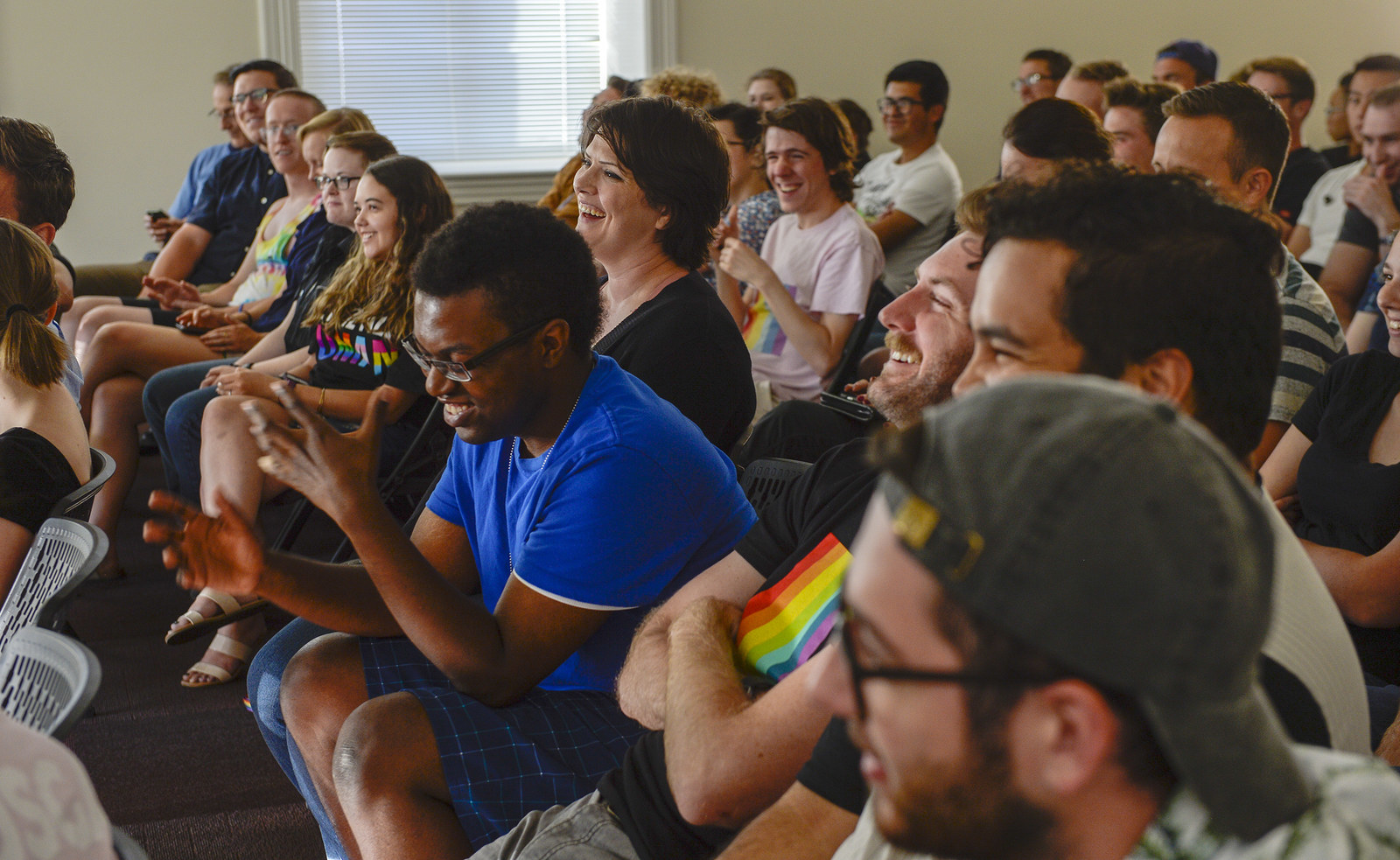
“If the drag queen needs to use the bathroom at your library after their reading, are they going to have trouble accessing a toilet?” asked Conley-Abrams, stressing that she is “100% in favor of drag queen storytime” but noticed that some libraries were using the program as a stand-in for the quieter, but just as important, work of affirming queer library users — like abolishing gender-segregated bathrooms and library card applications. “If you've got ‘male,’ ‘female,’ and ‘other’ [on your application], you're literally othering queer people, which is not a good look,” she said.
Many of the librarians I spoke to emphasized the importance of visually proclaiming libraries as safe spaces by developing a diverse selection of LGBT-inclusive books in easy-to-access areas, building extravagant displays for PRIDE month — “You couldn't walk anywhere without being knocked out by a quote from Harvey Milk,” said Conley-Abrams — and organizing community groups like queer book clubs, gay-straight alliances, and teen pride parties.
In more conservative parts of the country, creating a safe space for queer library users can be an act of discretion.
But in more conservative parts of the country, where attacks against drag queen storytimes have been most aggressive, creating a safe space for queer library users can be an act of discretion. Todd Deck, a librarian at the rural Tehama County Library, three hours north of Sacramento, said that community bulletin boards advertising queer-friendly events — typically placed in prominent areas in urban libraries — are most effective in areas of his library with less foot traffic, particularly for LGBT youth. He also emphasized the privacy afforded by self-checkout machines in small towns where “maybe your mom is best friends with the clerk.” “In a rural space, most likely everybody is connected in really beautiful but also really tricky ways,” he said.
Caring for LGBT youth can sometimes mean caring for people who are experiencing homelessness; they are 120% more likely to experience it than their non-LGBT peers. Julie Ann Winkelstein, a professor at the University of Tennessee who specializes in libraries as safer spaces for LGBT youth experiencing homelessness, stressed the vital role that libraries play in the lives of a particularly underserved demographic. Beyond loaning books, Winkelstein said LGBT youth experiencing homelessness are in need of other vital resources that libraries offer but are seldom recognized for: a sense of community, shelter from extreme weather, and access to resources for employment, housing, legal advice, and social workers.
“You have young people coming in who are carrying a huge amount of trauma — they need to be in an environment where at least it's not expanding on their trauma,” said Winkelstein. “They need to be in a place where they don't see something that feels anti-queer or anti-homeless,” which includes an excessive amount of negative signage — “It’s very triggering for a young person who already experiences a heck of a lot of ‘no’s’ outside of the library” — uniformed security guards, and address requirements for a library card.
Above all, librarians who identified as LGBT stressed the importance of being out at work. This can be communicated through accessories like queer-affirming pronoun buttons — “I'm not really a big button person, but some librarians are obsessed with them,” Deck said — rainbow pins, and bracelets. But mostly it’s about being confident in your own skin.
“The best thing you can do for kids is to be yourself as confidently as possible, which I know sounds really cheesy, but it's very, very true,” said Conley-Abrams, whose hair, cut short on the sides, is dyed a pinkish orange. “Because kids can't be it unless they see it, and kids have to see that there is a place for them in the world. And if they're just seeing homogeny they may worry that they have to completely change themselves in order to just be in the world, which is really scary. I am a symbol of someone who doesn't really look like other people at school but I still have a job and I'm a happy person and I found a place. And even if they're not just like me maybe I'll remind them that they'll have their place too.”
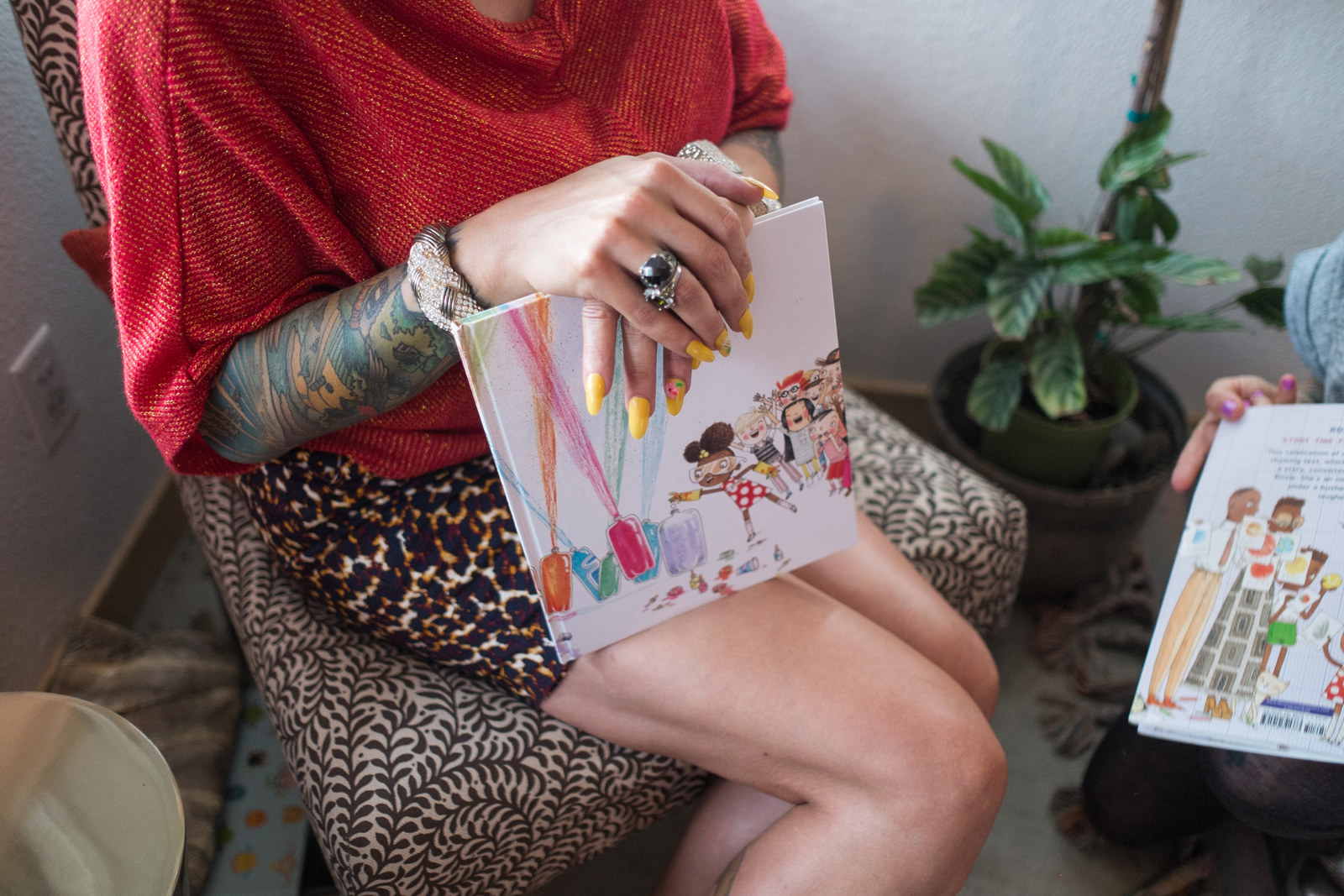
In May, when librarian Jennifer Stickles announced an event at the Olean Public Library, in a rural part of western New York, called Drag Queen Kids’ Party, she anticipated some pushback. The head of youth and adult programming wasn’t naive about the politics of Olean, which voted heavily in favor of President Trump. “We knew that there was going to be a few people who would call and complain,” she said. “We didn't know it was going to get as bad as it got.”
A post from the library’s Facebook page explaining the event — “teaching the children about acceptance, gender stereotypes, and that being different isn't a bad thing” — went viral locally and attracted a flood of negative comments, some of which, Stickles said, equated the program with rape and threatened to burn down the library. For weeks leading up to the event, the post galvanized conservatives: A local pastor barged into the library and told Stickles that she would burn in hell; people called the library saying that she shouldn’t be allowed to work with children because she identifies as queer; and neo-Nazi Daniel Burnside announced that the National Socialist Movement would be protesting the event. Stickles said that when she called the police department to organize security, they advised her to cancel the event.
When Stickles called the police to organize security, they advised her to cancel the event.
The day before Drag Queen Kids’ Party, a local reporter called Stickles to ask about the death threats issued against her — threats that she was unaware of. After hanging up the phone, she stood alone in her office overlooking the parking lot. “The walk between my office to my boss's office is the only time I thought for a split second like maybe I should reconsider,” she said. After talking it over with the library director, Michelle La Voie, Stickles made her decision: “I have to. There's no way I'm calling it off.”
After a night of tossing and turning — “I got an hour and a half of sleep. I was so nervous. It had just gotten to be too much,” she said — Stickles pulled up to the library, bracing for a scene. What she encountered shocked her.
“Just rainbows everywhere,” she recalled. Over 200 supporters flooded the front lawn of the library, many of whom arrived three hours before the event to deter protestors, including a group of drag queens who drove down from Buffalo. They waved pride flags and held signs advocating acceptance and diversity. Protestors, for their part, amounted to “mostly little old ladies from church,” said Stickles, and neo-Nazis who stayed in their vehicles and drove around the library yelling obscenities. Inside, over 70 children and their parents crammed into a reading room to watch Flo Leeta read two books and lip-synch songs from “Frozen.”
Two weeks later, connections fostered at the library led to Olean’s first public Pride event: a picnic in the local park. About 100 people showed up. “I've never been around so many gay people in Olean,” Stickles said. “We're doing our best to keep the momentum going and make the whole community more inclusive.” A few people from the picnic started a group called Cattaraugus County Pride Coalition, and they’ve already discussed securing a permit for Olean’s first ever Pride parade, in 2019.
It was an unexpected outcome but one that Stickles sees as integral to her role as a librarian. “That’s the job of the public library,” she said, “to fill a need when we see it, you know?”
View this video on YouTube
Backlash against programs like Drag Queen Story Hour have cast libraries as dynamic centers for civic progress, inadvertently reanimating conversations about who tax-funded institutions are responsible for serving — if the library is really for everyone, does that include hate groups? — and spotlighting the role of librarians as stewards of access and inclusion, a role that many have double-downed on since the election of President Trump.
“It's more an act of rebellion than it was before,” said Michelle Tea. “Under Obama, [Drag Queen Story Hour] just seemed like a really fun program to do — it was just fun — and it still is that, especially for the kids, but I think that one of the reasons why it is so popular right now is people are looking for things to support in space of what is happening to our culture, where so much hate is being emboldened.”
In Queens, as kids colored pages from The Dragtivity Book, Bella Noche stood to the side and reflected on the crowd, which seemed distracted at times. “This is a genuine audience,” she said. “If they're not interested, they will not hesitate to ignore you. It's cool winning over an audience of children, but also their parents — they’re protective over their kids. Their kids are the whole reason why they're here.”
She recounted an interaction with a mother after one of her readings. The mother’s son of about 7 years old approached her excitedly: “Mommy, Mommy, I know what I want to be,” he said. “When I grow up, I want to be a drag queen mermaid, too.” ●
Mitchell Kuga is a New York–based freelance writer whose work has appeared in the Village Voice, GQ, Saveur, and Hyperallergic, among others. His second job, after working the dollar-theater concession, was at the Salt Lake Public Library in Honolulu.
This article is part of a series of stories celebrating libraries and free access to information.


